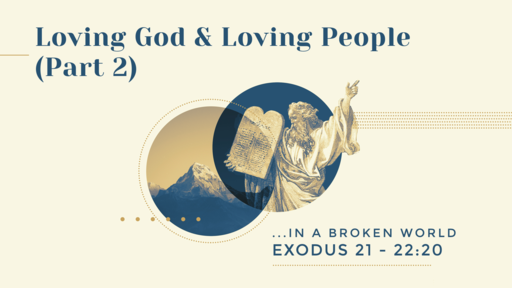Loving God and Loving Others (part 2)

We could easily subtitle this passage, "while living in a broken world." In Exodus, God formed a people to display His glory. He taught them how to live in community with one another. This section shows us that God is concerned with how we relate to one another in day-to-day life. God calls us to holiness, integrity, mercy, justice, and fairness in the ordinariness of life.
God PROTECTS the vulnerable
God is gracious, and he wanted his people to treat one another with the same kind of grace they had received when they were delivered from Egypt and went out loaded with silver and gold
God PROMOTES righteous conduct
Alexander, T. Desmond. From Paradise to Promised Land. Grand Rapids: Baker Academic, 2012
Because virtually everyone farmed in the ancient world, laws had to be put in place regarding animals. If it was written in our day, it might include laws related to automobiles
Most of us don’t own bulls, so in one sense this law is irrelevant to us. But it is nevertheless also expressing something that is timeless. Accidents happen, and people shouldn’t be held responsible for something that was an accident. But you can be culpable for an accident if you didn’t takes steps to prevent what could have been anticipated. So I learn two things from this passage:
■ I shouldn’t blame someone if they accidentally harm me.
■ If I can anticipate an accident, then I should take steps to prevent it.
In fact, it’s not difficult to distil what is timeless and universal in the Law of Moses.
God PROVIDES for the Wronged
God POINTS His people to PURITY AND HOLINESS
These three sins—witchcraft, bestiality, and idolatry—are so ungodly that it is almost embarrassing to mention them